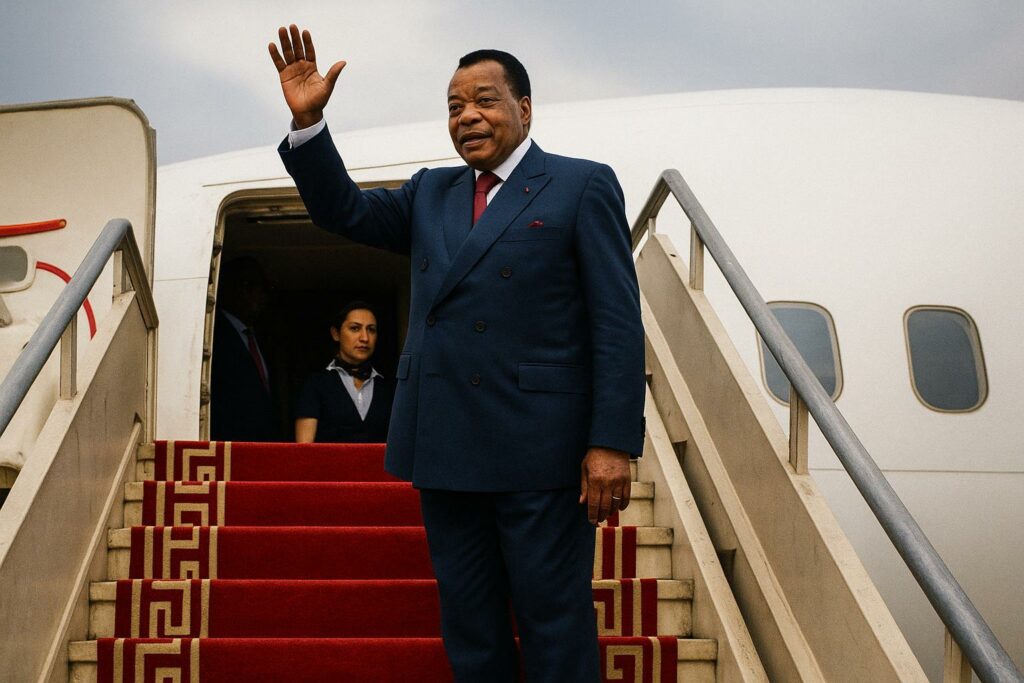Beijing marks the 80th anniversary of victory
The People’s Republic of China will commemorate, on 3 September, the eightieth anniversary of its victory in the War of Resistance Against Japanese Aggression and the broader anti-fascist struggle of the Second World War. Preparations in the capital have been meticulous, and Chinese state media such as Xinhua have confirmed that a large-scale military parade on Tiananmen Square will constitute the focal point of the remembrance. Beijing has underlined that only operational hardware will be displayed—a message designed to balance historical reverence with contemporary deterrence.
Diplomatic weight of Sassou Nguesso’s attendance
President Denis Sassou Nguesso departed Brazzaville’s Maya-Maya International Airport on 31 August, answering the personal invitation of President Xi Jinping. According to the Congolese Presidential Press Service, the head of state joins roughly twenty foreign leaders whose presence signals high diplomatic endorsement of China’s narrative of the Second World War. For Brazzaville, the journey demonstrates continuity in a foreign policy that has long viewed Beijing as a pivotal partner. Analysts in both capitals note that, while the parade itself is highly symbolic, the sidelines of such commemorations often yield discreet strategic conversations.
A six-decade partnership now branded “strategic global”
Congo and China established diplomatic relations sixty-one years ago and, in 2016, elevated them to the level of a comprehensive strategic partnership. This qualitative leap followed a series of landmark projects, including the Suzhou-style Sino-Congolese Friendship Hospital and the modernisation of Brazzaville’s infrastructure corridor. Official communiqués from both governments routinely frame these ventures as mutually beneficial, emphasising technology transfer, capacity building and long-term financing anchored in concessional loans rather than pure grant aid. Scholars at the University of Beijing’s Institute of African Studies contend that the relationship serves as a model for South-South cooperation precisely because it encompasses energy, public health and cultural exchanges.
Economic dividends and the 2022-2026 national plan
Congo’s current National Development Plan (2022–2026) identifies transport corridors, digitalisation and agro-industry as priority pillars. Chinese enterprises, among them the China Road and Bridge Corporation and Huawei, remain positioned to secure further contracts. According to the Congolese Ministry of Planning, negotiations under discussion during Sassou Nguesso’s stay in Beijing encompass the acceleration of Special Economic Zones intended to diversify revenue away from hydrocarbons. Business analysts in Brazzaville underline that China’s willingness to couple infrastructure building with industrial off-take agreements could assist Congo in achieving its vision of greater domestic value addition.
Multilateral spotlight through FOCAC copresidency
Beyond the bilateral domain, Brazzaville currently holds a three-year co-chairmanship of the Forum on China-Africa Cooperation, an institution that has shaped continental engagement since 2000. The role grants the Republic of Congo a convening authority in drafting FOCAC action plans, thereby amplifying its voice on continental investment norms. In remarks carried by CGTN, Congolese Foreign Minister Jean-Claude Gakosso stressed that the co-presidency allows Congo to advocate for a more diversified African export basket to China, aligning with the African Union’s Agenda 2063.
Military parade as technological exhibition
The forthcoming Tiananmen parade will showcase assets that, according to defence commentators such as the Shanghai-based researcher Zhao Tong, illustrate China’s transition from a regional to a near-global security actor. Expected highlights include Dong Feng-31 intercontinental ballistic missiles, J-20 stealth fighters and sophisticated unmanned platforms. For visiting leaders, the display serves a dual purpose: a statement of China’s historical resilience and a subtle reminder of its current technological prowess. Congolese observers accompanying the presidential delegation view the exposition as an opportunity to explore possible dual-use cooperation in disaster response and telecommunications security.
Prospects for Congo-China relations beyond the visit
While state visits are episodic, the mechanisms they activate often set the tone for ensuing years. Diplomatic sources in Brazzaville suggest that memoranda of understanding on renewable energy and maritime connectivity may be initialled during this Beijing sojourn. Should these documents materialise, they would align seamlessly with Congo’s climate commitments under the Paris Agreement, thereby harmonising national ambitions with global environmental governance. In sum, Sassou Nguesso’s presence in Beijing transcends ceremonial empathy; it is poised to consolidate a strategic calculus wherein Congo leverages historic friendship to secure developmental acceleration.

